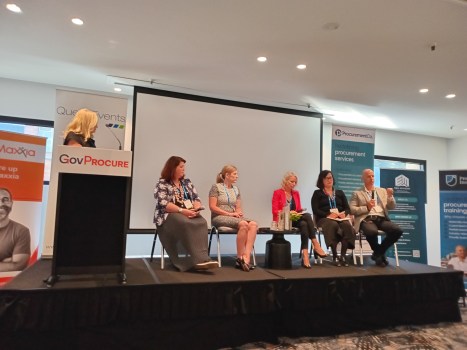Achieving value when spending doesn’t always depend on price, delegates attending a government procurement conference have been told.
“There is more to value for money than just the dollars,” Sarah Collins – head of procurement at the ABC – said. “There are social and sustainable elements of value.”
Think about how the spend will have a knock-on effect, Collins told delegates at GovProcure 2025 in Sydney this week. “You could spend it on an Indigenous supplier, a social enterprise, a small business – a regional supplier.”
As an example, Collins told delegates the ABC’s flu vaccine program is delivered by an Indigenous supplier. “For every dollar we’re spending with them, they are contributing money to give scholarships to Indigenous nurses who are then going out to remote locations and helping Indigenous communities.”
It’s not about aligning yourself to one cause or the other, Collins added. “It’s more about a shift in thinking. Yes, there are competing priorities … The main thing is you’re considering them all. You may not satisfy everybody when you get to the end. But it’s about taking into account everybody’s views and what people are looking for – not just the loudest in the room.”
Zoanne Morrissy – chief procurement officer for Parks Victoria – agreed there are many competing priorities when procuring for government. “So if you can be agile and adaptable and if you can pivot as much as you can, to be as user-focused as much as you can, I think that really helps.”
The first discussion panel of the two-day event also explored procurement strategy. Morrissy told delegates her strategy is to listen. “My best conversations are on the ground with the park rangers. They are coming to me with their problems and I’m working with them to help find solutions – it’s as simple as that. That’s what a chief procurement officer does.”
The number one deliverable for Parks Australia is for the state’s parks to be open, safe and clean, Morrisey said. “That’s it. So I’ve got to find better ways with my procurement strategy to achieve that.”

Luke Kenny – chief executive officer at Local Government Procurement – told delegates – many working in federal, state and local government agencies – the sector needs to open up, not to be so guarded and not to be afraid to bring suppliers to the table to discuss ideas.
“It’s something we like to encourage our councils to do in local government,” Kenny said. “Bring all the people in; share with them what you’re doing. Bring them into the space. Be transparent – tell them your problems. Tell them what you can’t do. Tell them about the things you can’t solve. Ask them what they would do.”
We sit in “public sector world” trying to solve every problem, Kenny said. “We create a façade that we know what we’re doing.” Maybe the supplier is sitting there with a solution, delegates were told. “Have some courage and be vulnerable about what you’re trying to wrestle with, but can’t fix.”
Adding to Kenny’s comments, Teresa Scott – executive director at the Australasian Procurement and Construction Council – told delegates, often, government procurement teams don’t understand what is happening in the outside world. “We are shy in engaging with suppliers before the tender and assessment stage,” she said. “The innovation lies within the supply base and we miss a lot of opportunity because we don’t engage early.”
Echoing Collins at the top of the story, Scott said government procurement is more than a just business transaction. “It’s a gateway between government and suppliers shaping how public funds are spent to ensure ethical and transparent and effective procurement practices are in place,” she said.
Delegates were told that, in Australia, government procurement accounts for 17 per cent of the country’s GDP. In some cases, agencies have up to 80 per cent of their spend allocated to procurement, Scott said. “With such significant spend comes significant responsibility. Ultimately, the way we procure goods and services directly influences public trust in government and our ability to deliver community outcomes.”




Leave a Reply